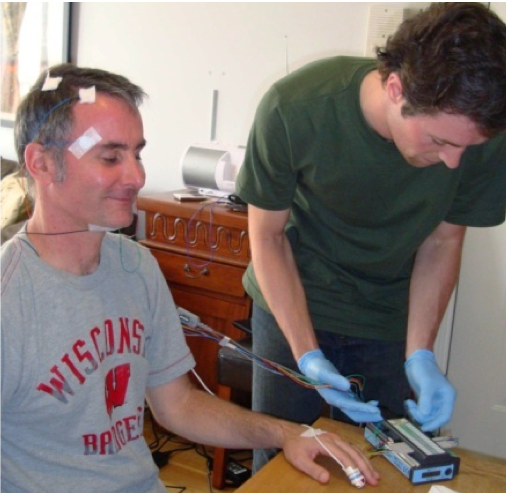Chronic Lack of Sleep Tied to Racial/Ethnic Differences in Disease Risk
Northwestern researcher finds African Americans at higher risk for insufficient sleep
Get all our news

in-home sleep study. (Photo: Kristen Knutson)
Previous research has already linked chronic inadequate sleep—defined as fewer than 6 hours for adults or 10 hours for children—or poor sleep quality to risk factors for obesity, diabetes, and high blood pressure. New research by IPR associate and sleep researcher Kristen Knutson is also pinpointing how differences in sleep between racial and ethnic groups could potentially explain higher rates of obesity and diabetes among African Americans and Latinos.
At a February 22 IPR colloquium, Knutson discussed her research from the Chicago Area Sleep Study (CASS), a cross-sectional study of sleep in 35- to 64-year olds. She and her colleagues examined socioeconomic differences in sleep for four racial/ethnic groups: whites, African Americans, Hispanic/Latinos, and Asians. They found that African Americans slept the least, an average of 6.8 hours per night, while whites slept the most, or 7.4 hours on average. Asian and Hispanics/Latinos got 6.9 hours of sleep on average.
Knutson is also interested in how people sleep in their own beds rather than the laboratory, but that often involves participants tracking their own sleep, which can be subjective. So, she designed an in-home study using both a wrist tracker and polysomnography, which uses sensors to measure participants’ sleep stages. The study revealed differences in quality of sleep between African Americans and whites.
She found that on average, African Americans got 20 fewer minutes of slow-wave sleep, also known as deep sleep. That might not sound like much, but “if your average is only 40 minutes, that is a big chunk of slow-wave sleep,” Knutson explained. Slow-wave sleep is the deepest, most restful physiological period and is likely relevant to metabolism.
So, how can researchers improve sleep and reduce disease? Knutson said community-based participatory research is key to developing solutions.

“When we start thinking about ways to improve sleep, I can’t just go out there and say, ‘Hey everybody, sleep one or two more hours,’ and I’m done,” Knutson said. “We have to think about what interventions will work and be feasible in different communities.”
She could, however, recommend some “sleep hygiene” tips, which include avoiding drinking too much alcohol, going to bed around the same time every night, and sleeping in a dark, quiet room. Engaging in a relaxing activity 15–30 minutes before bed and avoiding smartphone or laptop light before bedtime can also help. She also recommends ear plugs or eye masks to block disrupting sounds and light. Given that research has long demonstrated that stress takes a toll on sleep, stress management skills might also be helpful, she said.
If none of these interventions seems to work, it is possible that sleep apnea or another sleep disorder could be to blame. Knutson encourages people to discuss their sleep problems with their doctor.
“Sleep is a biological necessity that is strongly influenced by beliefs, behavior, and the environment,” Knutson said. “This means that we have the potential to improve sleep if we can identify causes of inadequate sleep and the ways to overcome them.”
Kristen Knutson is associate professor of neurology (Sleep Medicine) and preventive medicine at Northwestern’s Feinberg School of Medicine and an IPR associate.
Published: February 28, 2018.